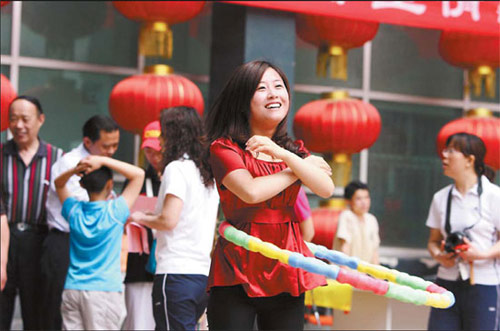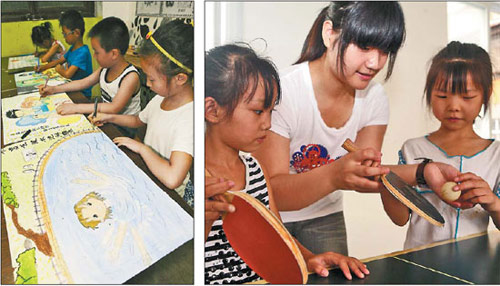Neighborly calling
Updated: 2012-10-17 09:24
By Wang Ru (China Daily)
|
|||||||||||
 |
|
Residents hula hoop, kick shuttlecocks and do sit-ups in activities organized by the Hepingli neighborhood committee in Shandong's provincial capital Jinan. Liang Zhijie / For China Daily |
The community committee's function has continued changing with the country. Wang Ru reports.
Related: Keeping society on the grid
Wang Zhenxiang was shocked the moment he opened the door of the room from which the mysterious stench emitted.
The tiny apartment was like a dump. It was piled with putrid trash to the point there was hardly room to walk inside.
The apartment belongs to a man in his 60s, who has a hoarding problem. He can't bear to throw anything away, he says.
Nobody knew why the building had smelled so rancid until neighbors asked Wang to investigate.
Wang called a truck and helped the man's children clean the apartment. He also persuaded the children to take their father for counseling.
Such strange experiences are common for Wang, a 56-year-old who has served the community Party committee since 2003. He is the committee's secretary and leads 17 colleagues to take care of various tasks at the Xiaoguan community in Beijing's Chaoyang district. It's one of the city's largest, with 8,500 households of 20,000 permanent residents.
The neighborhood committees - aka juweihui - arose as "autonomous urban grassroots civil organizations" in the 1950s.
Actually, the juweihui are the lowest level of government in charge of civil affairs. They're watchdogs, who enforce such policies as family planning, mobile population management, crime prevention and census administration.
But most urban people today, especially employed youth such as 27-year-old Mao Dan, have few connections with the committees.
Mao, who lives in a Beijing commercial residential community managed by a professional property-service company, views the committees as nothing more than "family-planning" and "population census" agents.
"I have no clue where our committee is located," she says.
"I've heard it's an easy job. All they do is stamp documents and collect fines."
That was perhaps true a decade ago.
But the acceleration of urbanization has brought the committees' primary purpose back to serving residents, especially those in need, rather than simply enforcing government decrees.
Wang spent the entire night of the July 21 downpour that killed dozens in Beijing pumping water out of the basements to prevent flooding.
Wang and his colleagues work around the clock. They undertake such tasks as organizing free hobby classes; coordinating secondhand exchange markets; removing illegal advertisements; ensuring sanitation; and organizing 500 volunteers to care for the elderly and those living with physical or mental disabilities.
"We must deal with civil affairs, no matter how trivial or important," he says.
"And residents' voices must be heard, whether they offer praise or sling abuse."
Related Stories
Rock the outdoors 2012-08-17 16:20
Jessica Simpson: Working hard to lose weight 2012-07-19 13:44
Active video games not a fat fix 2012-07-18 09:42
Events promote use of library 2012-06-19 14:39
Diplomatic Pouch 2012-06-04 13:44
'Paranormal 3' breaks box office records 2011-10-24 14:04
Today's Top News
Rescuers race against time for quake victims
Telecom workers restore links
Coal mine blast kills 18 in Jilin
Intl scholarship puts China on the map
More bird flu patients discharged
Gold loses sheen, but still a safe bet
US 'turns blind eye to human rights'
Telecom workers restore links
Hot Topics
Lunar probe , China growth forecasts, Emission rules get tougher, China seen through 'colored lens', International board,
Editor's Picks

|

|

|

|

|

|






